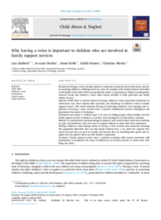Abstract
Background
Having a voice in family matters is considered a protective factor from harm, and key to promoting children’s wellbeing. However, since the adoption of the United Nations Convention on the Rights of the Child (1989) and specifically Article 12 pertaining to children’s participation, research reveals that children’s voices often remain invisible in child protection and family welfare services.
Objective
While there is renewed interest in hearing children’s voices about their experiences in out-of-home care, there remains little awareness and knowledge of children’s voices in family support services. This article addresses this gap by presenting children’s own meanings and experiences of having a voice, derived from a research collaboration between UnitingCare and Queensland University of Technology .
Participants and setting
17 children aged 6–16 years (8 sibling groups) whose families received family support services (voluntary or ordered) from UnitingCare in Queensland, Australia.
Methods
An interpretative phenomenological approach with activity-based interviews involving art, play and Reflexions cards were used to support children to share their lived experiences.
Findings
Children’s sense-making related to having a voice revealed four connected meanings that poignantly illustrated that not only should children have a say about the supports they receive because they are part of a family, but because they are knowledgeable agents with insights that can improve their and their family’s experiences.
Conclusion
Family support services need a sustained paradigm shift towards protection with participation to incorporate the voices of children as an everyday practice to ensure their wellbeing and safety.

